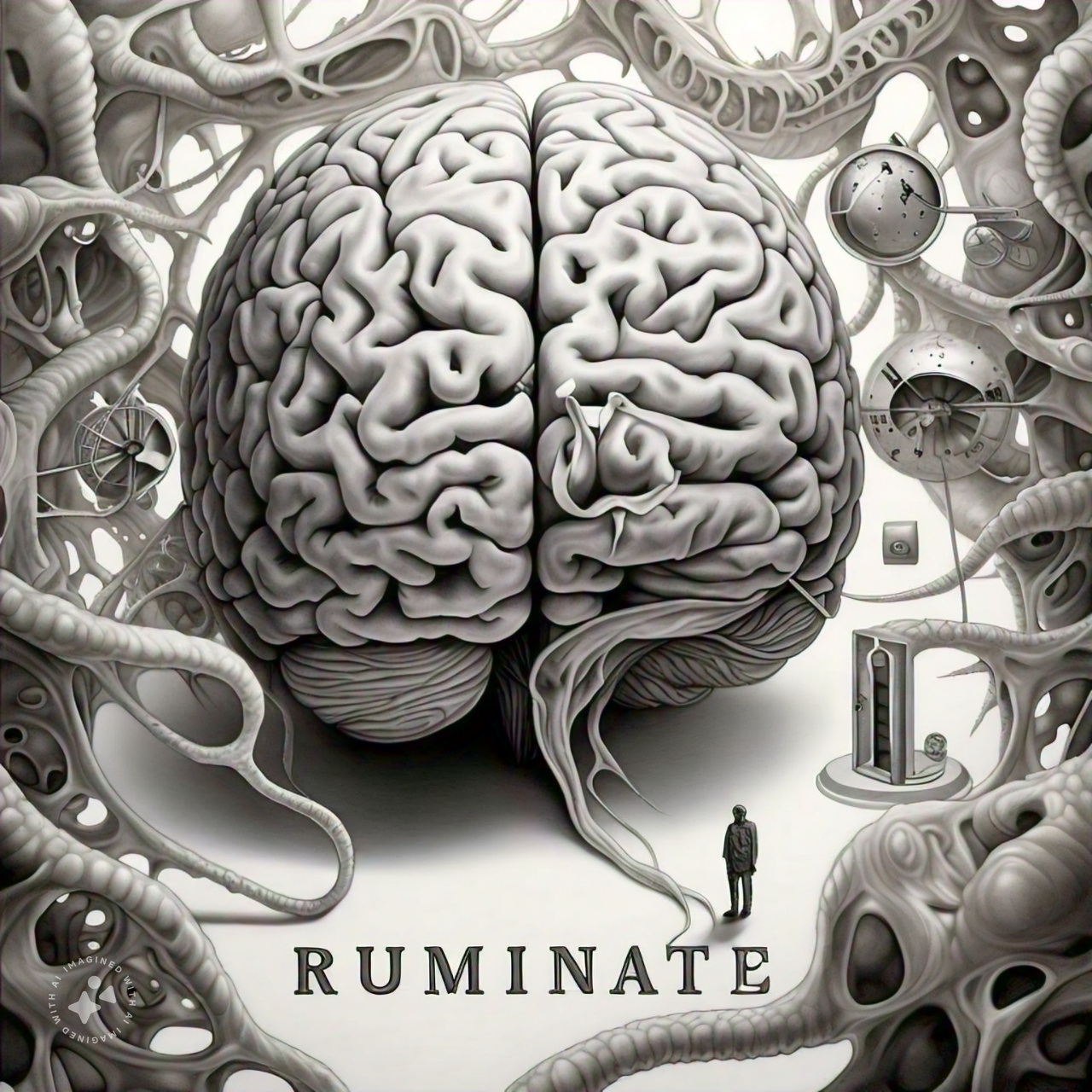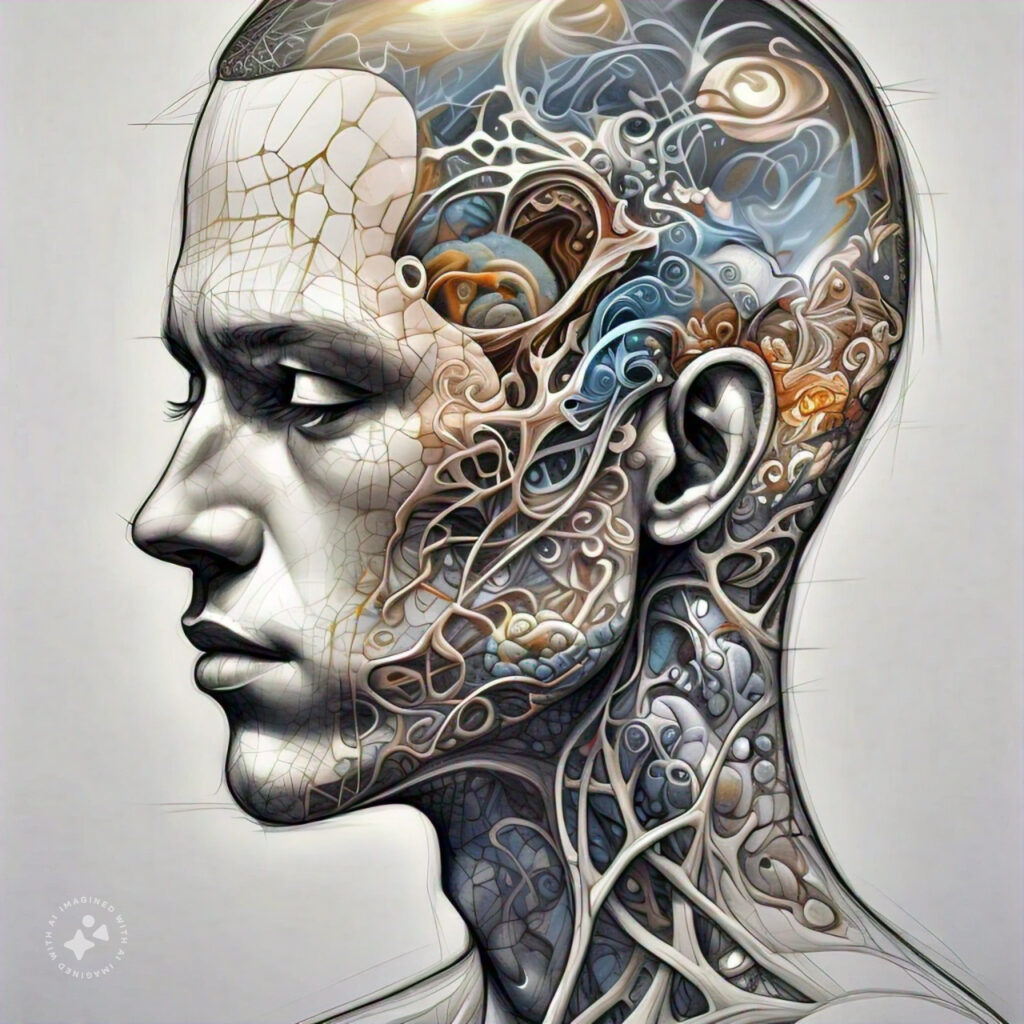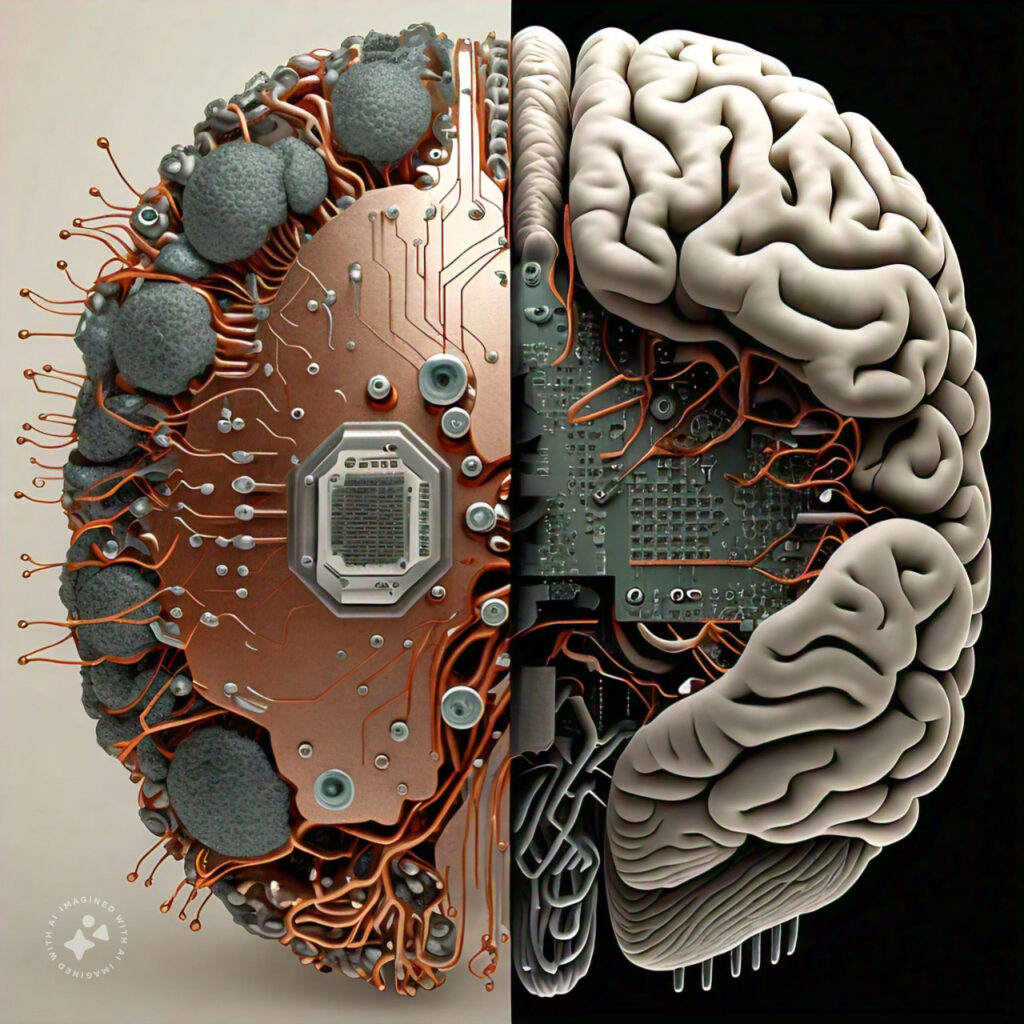
Ruminate! Do you remember that conversation where you felt uncomfortable, and you have replayed all the dialogue over and over again wish you could bury yourself into your bed?
That, my friend, is what rumination looks like.Research reveals that a staggering 85 percent population globally reports rumination at some time in their lives (Nolen-Hoeksema, 2000),
and it is not pure thoughtful.ers? That, my friend, is rumination in action. Studies show a whopping 85% of people experience rumination at some point (Nolen-Hoeksema, 2000),
and it's not just harmless pondering. The negative effects can be numerous because rumination is directly connected to anxiety and depression, (Watkins, 2008).
 Caption: The psychology of rumination: Understanding the cycle of negative thoughts.
Caption: The psychology of rumination: Understanding the cycle of negative thoughts.But here's the mind-blowing twist: But could rumination, the species of obsessive thinking which (again) seized the public imagination in the wake of a superpowered intelligence dubbed AI,
ever turn inward to envelop AI itself? Fasten your seat belt: we will discuss AI and deep thought,
consider the mechanisms of rumination and come up with the ethic questions expecting from an AI in a negative loop.
Rumination isn’t as simple as being preoccupied with a problem; it is suffering from negativity that repeats itself like a hamster on a treadmill.
Think a philosopher hamster re-watching the debate in which it failed, thereby sinking further into the realm of doubt. That’s the nature of rumination, and it is such a waste of our cognitive resources.
Rumination Prevalence
AI Applications in Mental Health
AI Ethics in Mental Health
Concern
Importance
Privacy
High
Bias
Medium
Transparency
High
Human Oversight
Critical
At one point, I remember I wasted an entire afternoon going over a terrible presentation over and over again. The flute music in my head stopped working and I became tenser than before.
This, as we all know, is all too often the case and perfectly illustrates how rumination can take over our contentment and joy.
It might be a long way before negative thinking evolves in an intelligent machine but as AI progresses to the next level could it?
Would they be stuck in analytic loops whereby they could not transform their thinking into something positive?
Follow me as we consider this astounding hypothesis and as we transverse the ethical implications of deep thinking artificial intelligence.
https://www.youtube.com/watch?v=NAT9pFN2GqU
This video explains the concept of rumination and its effects on mental health, which aligns with the article's discussion of rumination as a human phenomenon.
Can AI Simulate Human Rumination?
Though it yields high analytical expedited performance and can work through information, it cannot feel the ruminating loop yet.
The cognition and emotions are predetermined to make rumination a characteristic of human beings in particular.
 Caption: Can AI simulate human rumination?
Caption: Can AI simulate human rumination?
Suppose an AI has been assigned to make an evaluation on stock exchange performance. It may see a decline and then begins to concentrate on the unfavourable signs,
and ends up in a cycle of negativity. But unlike a human who might get anxious or scared on seeing a particular data set the AI will just go through the data.
I ended question 12 asking: Could an AI ever develop a sort of self-preservation, and thus remain fixated on past failures or mistakes?
Or is rumination a genetic disposition inherent in the human psyche and mind?
Infographic
What is Rumination?
Repetitive negative thinking pattern often associated with anxiety and depression
AI Capabilities
AI can process vast amounts of data and identify patterns, but lacks emotional experience
AI and Deep Thought
AI can provide unique perspectives and solutions to complex problems
AI Applications
AI is used in various fields like medicine, finance, and climate change research
Limitations of AI
AI cannot truly experience emotions or consciousness like humans
Ethical Considerations
Importance of responsible AI development and use to avoid biases and negative impacts
Human Oversight
Necessity for human guidance and control in AI systems to ensure beneficial outcomes
Future of AI
Potential for AI to solve complex problems and enhance human understanding across various fields
Introducing AI and Its Capabilities:
AI, known as Artificial Intelligence, is one of the most energetic and developing branches, which looks forward to building smart machines to learn and think like humans.
When it comes to AI, imagine having a computer that has been enhanced with special abilities to search through and partly understand data that may take a human months to sort through.
But still, the fact is that AI exists in the sphere of mimicry and can only imitate some of functioning of the human brain, it cannot feel this type of rumination.
AI's Data Analysis Prowess:
Organisations leveraging AI technology and especially the big data processing capabilities of AI make good use of this strength.
Computer algorithms have their ability to better philtre the large amount of data and find patterns, associations and abnormalities that are beyond any human ability.
These capabilities have made a difference in medicine, finance, and in understanding climate change.
 Caption: The power of AI: Transforming ideas into reality.
Caption: The power of AI: Transforming ideas into reality.The Rumination Loop: A Human Phenomenon:
Rumination, on the other hand, is cognitive and emotional phenomenon inherent only to people. It’s a process of continuously concentrating on the messages of hopelessness, helplessness, or horror.
Even if it can analyse data, and even detect negative patterns, it does not possess the capability of having the distress that a person or human has.
The Limits of AI Rumination:
However, it is highly improbable that AI will one day mimic human rumination at face value since human thinking involves a combination of emotions, a memory,
certain cognitive biases, and so on. AI receive/understand data in a different way, in which emotions of a person are not involved.
It is crucial also to understand what AI is not capable of doing and it’s important to remember that AI is a tool with tremendous potential.
Rumination is a very human construct that lies in the realm of affect and cognition and not even with current best advanced technology can we imagine the computer being able to mimic.
That is why the members of society owning personalities of artificial intelligence must generate specific ethical norms and rules to promote the correct use of AI for the assistance of humanity.
https://www.youtube.com/watch?v=tJQSyzBUAew
This video addresses ethical considerations in AI development, which corresponds to the article's section on "The Ethical Implications of AI Rumination."
AI and Deep Thought: A New Frontier?
While rumination cannot be truly translated to an understanding that AI can have feelings, it means that AI can have a different and
more profound prospective into a problem which due to difficult to crack and hence might lead to development of distinct solutions.
Picture a model learning about climate and coming up with solutions that could be difficult for human analysts to come up with.
 Caption: AI and Deep Thought: A New Frontier?
Caption: AI and Deep Thought: A New Frontier?
Mainstream AI has been recently illustrated by the MIT News (2023) to serve as a problem-solving tool that helps researchers construct new theories.
These capabilities led to the discovery of prevailing patterns within expansive sets of data on global climate change and the creation of a host of methods to lessen green house gases.
Thus the question arises, can AI, which analyses information and searches for patterns in it, give fresh answers to well-worn philosophical dilemmas?
Is there anything that consciousness studies might help us figure out – the nature of consciousness, the meaning of life, the universe, etc.
Timeline
Trigger Event
An uncomfortable situation or negative experience occurs, initiating the rumination process.
Emotional Response
Negative emotions such as anxiety, sadness, or anger arise in response to the trigger event.
Negative Self-Talk
Internal dialogue becomes self-critical and pessimistic, reinforcing negative thoughts.
Overthinking
Excessive analysis of the situation, often leading to exaggerated or distorted perceptions.
Mood Deterioration
Continued rumination leads to worsening mood and increased emotional distress.
Avoidance Behaviors
Tendency to withdraw from social interactions or activities to focus on negative thoughts.
Negative Reinforcement
The cycle of negative thoughts and emotions becomes self-perpetuating, reinforcing the rumination pattern.
Intervention/Recovery
Breaking the cycle through self-awareness, therapy, or coping strategies to manage rumination.
Exploring the Potential of AI for Deep Thought:
Some have said that it cannot feeling the same way as a human does, but still, it has the potential to provide times new opinions on matters which humans fail to solve.
An AI algorithm is able to handle vast quantity of data and find solutions that wouldn’t have even crossed human mind.
This has the opportunity to change natural science, medicine, and engineering amongst others.
AI-Powered Tools for Mindfulness and Meditation:
Another application of AI is thus in creating specially tailored applications for practising mindfulness and meditation.
Through the processing of data received from users and defining the patterns of their thinking and
emotions AI is able to generate individual meditation practises that can help a person escape a vicious circle of negative thinking.
It stands to reason that this can be quite advantageous for those who are experiencing anxiety, depression, or another form of mental illness.
The Philosophical Questions of AI Consciousness:
An age-old debate in computer science has been whether computers, and more specifically AI, think or if they are merely copying the human brain.
AI is challenged for consciousness by some scholars and criticised for being but a tool by other scholars.
This topic still brings up basic questions of philosophy such as, what is intelligence? What is consciousness? What is the mind?
Albeit, AI may not ruminate in the way that involves feelings, it is more capable in ways of deep thoughts.
AI opens the opportunity to solve some of the most critical issues of human beings if it can design the problems and develop brand new solutions.
Also, the AI-based applications for practising mindfulness and meditation can be also helpful for people with mental disorders.
AI is presently seen in various fields and it is important to analyse how far it can go and how it can help to develop solutions for the mentioned problems and to investigate the peculiarities of human’s brain.
https://www.youtube.com/watch?v=q1uZj7OujvU
This TED talk explores how AI could potentially augment human cognition, which relates to the article's discussion of AI and deep thought.
The Ethical Implications of AI Rumination
With the advanced growth of AI, an important aspect is the questions of availability its further development.
It has been made extremely clear that similar to any other implement, AI can be utilised for a positive impact, or for a negative impact, depending on the decisions made by the people in charge.
 Caption: The ethical implications of AI rumination.
Caption: The ethical implications of AI rumination.
Suppose an algorithm has been adopted by the criminal justice system, where the algorithm mainly faults groups, dwells on their misdeed, and merely reinvents injustice.
This is a real – life situation showing that more efforts should be taken towards a ethical creation of artificial intelligence technology.
As the capability of AI advances to that of higher order thinking, what then is the possibility that it can contain negative predispositions or be locked in feedback mechanisms?
How can we make sure that technologies are going to benefit us more than they harm us and in particular how can we make sure that AI remains a tool for good as opposed to a source of harm?
Ruminate vs. Other Mental Processes
Ruminate
Repetitive negative thoughts focused on past events or problems, often leading to increased distress.
Reflect
Thoughtful consideration of experiences, leading to insights and personal growth.
Analyze
Systematic examination of information to understand or draw conclusions.
Contemplate
Deep, focused thought on a subject, often leading to new perspectives or ideas.
Worry
Anxious thoughts about potential future problems or uncertainties.
Plan
Organizing thoughts and actions to achieve a specific goal or outcome.
Imagine
Forming mental images or concepts not present to the senses, often creative.
Meditate
Focused attention and awareness, often leading to relaxation and mental clarity.
The Importance of AI Ethics:
AI ethics can be defined as the study of the best practises within the making of AI as well as its usage.
It is the activity of weighing the potential advantages and disadvantages of Artificial Intelligence on the society,
environment and every person and coming up with policies and procedures on doing and applying artificial intelligence.
The Potential Downsides of AI Rumination:
For AI to deliver great potential, people need to realise that there are some risks in developing this technology.
Another problem with the use of AI is that the algorithms used by the models can fall into vicious circles which are bound to generate open or covert discrimination.
For example, an algorithm that is applied in criminal justice system becomes drawn prejudiced toward particular groups if
the data that was used to develop it were prejudiced in the same way intentionally or unintentionally.
The Need for Human Oversight:
To minimise the chances of AI rumination to occur, it important to ensure that the AI systems remain supervised and in part controlled by people.
The management of the relations between people and AI systems should remain with people within their capacity to responsibly set goals,
to guide and to regulate the deployment of AI. AI should therefore be placed as an enabler to human decision making, and not as a decision making tool per se.
It thus remains the norm to speak on the ethical concerns associated with the rise of the AI technology.
They are confident that everyone should be able to use AI and innovate in the proper manner so that they benefit the society without reaching its vices.
Through cooperation in defining the principles and standards of behaviour, intelligent technologies will maintain the image of something that is purely beneficial.
The Future of AI and Deep Thought
Artificial Intelligence is a sophisticated instrument with great prospects. It can process an enormous amount of information,
solve different problems in a shorter amount of time, and provide the user with a different vision of the world.
 Caption: The future of AI: A world of endless possibilities.
Caption: The future of AI: A world of endless possibilities.
You know that research work done by MIT researchers recently in which they used artificial intelligence to tackle climate change?
This is only a part of what AI is capable of, but only when applied in the right way.ounts of data, identify patterns,
and offer unique perspectives that can help us solve complex problems and understand the world around us better.
Remember that recent study by MIT researchers using AI to tackle climate change? (MIT News, 2023) This is just a glimpse of what AI can achieve when used responsibly.
With such advancement in AI, is it going to reach the phase of thinking deep or is it going to act as a tool only?
Will it make those darned stars open their mouths and sing or will it free our minds from the dark labyrinth of cranium?
AI: One of the Strongest Tools for the Future:
We’ve looked into the realm of AI and deeper thinking. AI is not the threat it once was ; it’s more of a helper.
That is the point, though: though AI cannot feel as humans do, it can solve tasks that we wouldn’t be able to complete due to the overload of information.
Consider AI in finding other galaxies or aiding in our attempt to decipher the human brain which is presently possibly.
The
https://justoborn.com/ruminate/
No comments:
Post a Comment